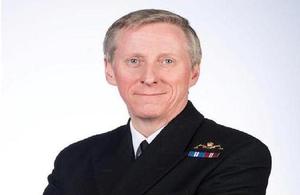New UK Military Representative calls for Alliance to remain focussed on its founding principles
In an interview for this website, the UK Delegation to NATO’s military representative shares his thoughts on his role, the future of the Alliance and more.

Vice Admiral Ian Corder
Vice Admiral Ian Corder recently took over as the UK’s Military Representative to NATO, replacing his predecessor Air Marshall Sir Christopher Harper. As the UK’s top military official at NATO, Vice Admiral Corder plays a crucial role in shaping the military aspects of NATO defence policy. In an interview for this Delegation’s website, he talks about his role as the UK’s Military Representative (or MILREP for short), the challenges facing the Alliance in the future, and what he likes to do in his spare time.
Question: What were you doing in your previous role before joining the UK Joint Delegation to NATO?
Answer:
For the past two years I have been the Royal Navy’s operational commander (COMOPS), responsible for day to day command of all the ships, submarines, aircraft, and Royal Marine Units of the Royal Navy and the Royal Fleet Auxiliary deployed on operations’’. This could range from patrol vessels policing UK fisheries, through ships and task forces on global deployments, through to our ballistic missile submarines on deterrent patrol. I was also the professional head of the UK’s submarine service and NATO’s submarine force commander. My time as COMOPS saw heavy involvement in a wide range of real world operations ranging from Unified Protectorate (Libya) through to the Olympics.
Q: How have your first few weeks in the new role been and what aspect of the new job are you looking forward to the most?
A:
Fascinating, although without too many surprises as I have been associated with NATO and the EU before, and many of the issues we face have an enduring element to them. That said, I am very much looking forward to taking them forward with the excellent team with have here in the delegation, and indeed back in London in both the FCO and the MOD.
Q: Are there any areas or topics you’ve had to work on which you hadn’t expected to?
A:
Not really, having been a deputy director in NEP eight years ago, if anything I am struck by the continuity of the core agenda….so no surprises yet. However, who knows what will come around the corner tomorrow!
Q: What are the main challenges the Alliance faces in the next few years?
A:
Self evidently the principal challenge will be a recalibration of NATOs core purpose and narrative post ISAF and Afghanistan; essentially we need to answer a sceptical public asking “after Afghanistan, what is NATO for”. But we have been here before so we should have confidence in our ability to succeed. The trick, I think, is to remain focussed on the founding principles of the Alliance - the transatlantic link and commitment to collective security - work to ensure they are solid for the future and then to interpret them in terms that are relevant to the emerging security environment, and in a way that resonates with our respective publics. This means recognising that collective defence is not merely territorial and that existential threats are not only kinetic. This analysis and the associated public diplomacy should be our main effort.
Q: What do you like to do in your spare time and do you like to follow any sports?
A:
Following two plus years in operations, I am still coming to terms with the novel concept of spare time! That said, sailing around the med, exploring the restaurants of Europe, a self-destructive urge to prove that I can still beat my two sons at squash (both half my age), a run around the park, strumming a guitar, and armchair rugby, cricket and formula one all come together to ensure that I am seldom bored.
Vice Admiral Corder’s full biography can be seen here.
Updates to this page
-
photo removed
-
photo added
-
First published.